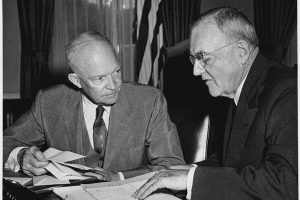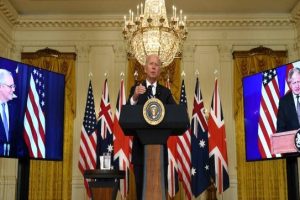Overwhelming voices of opposition were blocked, and the state funeral of former Prime Minister Abe was forced on September 27. No major (G7) leaders attended, but that wasn't a big deal. The 12-member US delegation led by Vice President Harris was joined by Indian Prime Minister Narendra Modi and Australian Prime Minister Albanese. Japan, the United States, Australia, and India all stepped together, and former Prime Minister Shinzo Abe was praised as a great man who advocated the Indo-Pacific Initiative, which gave birth to the Quad, a framework for security cooperation consisting of four countries. Japan, which had been the first to say it, was made to once again pledge to contain China and take the lead in defending Taiwan through condolence diplomacy at the national funeral. The United States tied Japan down by disguising Abe's state funeral as "a funeral for a great man." The national funeral highlighted that it was a ceremony "of America, by America, for America."
■ A barrage of "great"
Washington's statement was summed up in a source from the U.S. delegation who said, "I do not intend to comment on Japan's internal affairs (over the state funeral). Mr. Abe is a great friend of the United States and a great leader of Japan." . Indian Prime Minister Modi told Prime Minister Kishida, "Mr. Abe is a great figure in Japan-India relations," and Kishida pledged to "inherit the 'free and open Indo-Pacific' initiative (advocated by Abe)." Australian Prime Minister Albanese said, "The 'Quad' dialogue could not have started without Mr. Abe's leadership," and confirmed cooperation with Japan toward the realization of the "Indo-Pacific Initiative."
In his condolence address at the state funeral, Kishida said, "When you stood in the Indian parliament, you preached the 'confluence of the two seas' and came up with the concept of the 'Indo-Pacific' for the first time." "Your vision has taken a step further, and you have nurtured it into the framework of a 'Free and Open Indo-Pacific. In addition, he said that you have significantly strengthened relations with the United States, enhanced cooperation with India and Australia, and created the framework of the Quad. "We will build Japan, the region, and the world on the foundation you laid." This oath cannot be taken literally. It becomes a reality only when we rephrase it as "the United States, which has laid the foundation, will build Japan, the region, and the world on top of it."
 The Dulles Curse is an outspoken statement by U.S. Secretary of State John Foster Dulles when the San Francisco Peace Treaty and the Japan-U.S. Security Treaty were concluded simultaneously in 1951. I quote again.
The Dulles Curse is an outspoken statement by U.S. Secretary of State John Foster Dulles when the San Francisco Peace Treaty and the Japan-U.S. Security Treaty were concluded simultaneously in 1951. I quote again.  since the Suez Crisis in 1956. However, the quadrilateral framework/quad of the United States, Australia, Japan, and India was passed through, and the military alliance AUKUS of the three Anglo-Saxon countries of the United States, Britain, and Australia was launched in September 2021.
since the Suez Crisis in 1956. However, the quadrilateral framework/quad of the United States, Australia, Japan, and India was passed through, and the military alliance AUKUS of the three Anglo-Saxon countries of the United States, Britain, and Australia was launched in September 2021. 